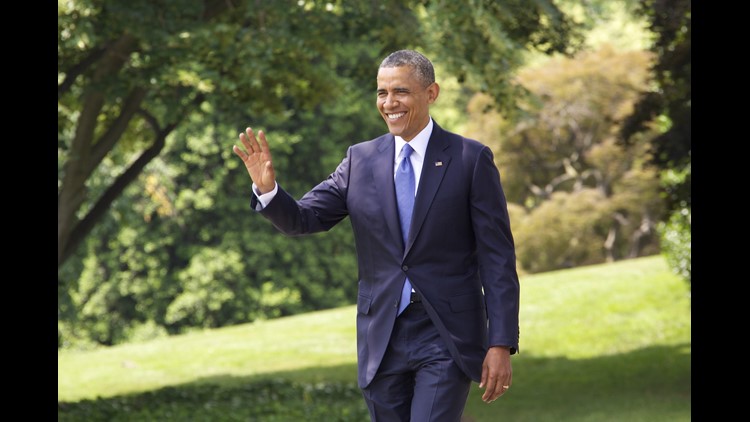President Barack Obama will become the first sitting U.S. President to visit Cuba in 88 years, when he visits Havana in March, White House press secretary Josh Earnest announced Thursday.
The visit, which is scheduled for March 21-22, is another big step by the administration in ongoing efforts to normalize diplomatic relations with Cuba.
The President announced the news via Twitter on Thursday.
“14 months ago, I announced that we would begin normalizing relations with Cuba – and we’ve already made significant progress,” he tweeted. “Our flag flies over our Embassy in Havana once again. More Americans are traveling to Cuba than at any time in the last 50 years.”
“We still have differences with the Cuban government that I will raise directly. America will always stand for human rights around the world,” he tweeted. “Next month, I’ll travel to Cuba to advance our progress and efforts that can improve the lives of the Cuban people.”
The White House also announced Thursday that the President will meet with Cuban President Raul Castro, as well as entrepreneurs and different members of Cuban society.
The President aims to continue to “chart a new course” for U.S.- Cuban relations by connecting U.S. and Cuban citizens through travel, commerce and access to information, according to Earnest.
The President will be joined by the first lady on his trip to Cuba, after which they will visit Argentina for two days.
The last sitting U.S. President to visit Cuba was Calvin Coolidge in 1928.
“President Coolidge traveled to Cuba on a U.S. battleship, so this will be a very different kind of visit,” Deputy National Security Adviser Ben Rhodes wrote in a post on Medium.
In the Medium post, Rhodes cited the progress made between the two countries since Obama took office, but also acknowledged there is more to be done especially on human rights and added that the President will continue to raise those issues to Castro.
“As the President has said, Cuba will not change overnight, nor will all of the various differences between our countries go away,” Rhodes wrote. “But the guiding principle of our Cuba policy — our North Star — remains taking steps that will improve the lives of the Cuban people.”
The trip, long expected, comes after Obama’s administration formally reopened ties with Havana in late 2014, following a half-century of enmity.
The visit was first reported Wednesday by ABC News.
Speaking at CNN’s GOP town hall on Wednesday night, presidential candidate Marco Rubio slammed the announcement.
The Florida senator said that if he were president, he would not visit the island nation — unless it were a “free Cuba.”
The Cuban government is “an anti-American communist dictatorship,” said the Cuban-American senator, who has been an outspoken critic of Obama’s Cuba policy. “They’re a repressive regime.”
Texas Sen. Ted Cruz, whose father emigrated from Cuba, also disparaged the prospect of a presidential visit.
“I think it’s a real mistake. I think the President ought to be pushing for a free Cuba,” Cruz said at the same town hall. “My family has seen firsthand the evil and the oppression in Cuba. We need a president who stands up to our enemies.”
The American embassy was reopened and a U.S. flag raised at the compound on Havana harbor in August.
Since then, high level U.S. officials have traveled to the island, including Secretary of State John Kerry and transportation chief Anthony Foxx.
Travel restrictions have been loosened and economic channels revived. Obama shook Cuban leader Raul Castro’s hand during an historic face-to-face meeting last spring.
That meeting, which transpired during a summit in Panama, was regarded as a breakthrough. But images of the American President stepping onto Cuban soil will provide Obama a lasting illustration of his adage that diplomacy with traditional U.S. foes can yield concrete results.
Last week, U.S. air carriers entered a bidding war to secure routes to Cuba after both nations signed an agreement to resume flights between the island and the United States.
U.S. travelers, who previously were required to adhere to strict conditions for visits to Cuba, are now able to apply for a broad range of travel licenses, included trips for cultural exchanges and humanitarian work.
But travel purely for tourism won’t be allowed until the U.S. Congress lifts a longstanding embargo, which also restricts most trade with Cuba.
Many lawmakers stand opposed to such a move, arguing the regime in place in Cuba restricts dissent and tramples on citizens freedom of expression.
Leading up to the announcement of Obama’s trip, White House officials said Cuba would need to demonstrate human rights reforms before the President would travel there.
Officials say Obama could visit the island to witness a signing of a peace accord between the government of Colombia and the FARC rebel group. Obama committed $400 million to the Colombian government in his most recent budget proposal to implement the deal.



